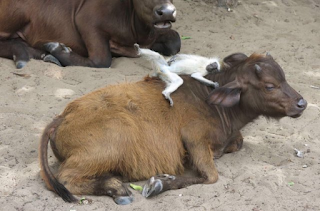This past winter, the chipmunk and his family barely made it through the winter. Our young valiant little chipmunk knew that his parents would not make it through another winter with such little food. He volunteered to venture off to find new sources of food for the family. His parents reluctantly agreed, and the young chipmunk headed off on his adventure. He wandered for days and days, searching for a steady source of food for his family.
One week after his journey began, the chipmunk found a small grove of oak trees. Acorns galore were scattered on the ground. There was enough food to feed the chipmunk family for an entire winter! Yet, the chipmunk knew that his family would be in the situation the following spring- they would run out of food and the young chipmunk would have to journey off to find more, again. Thus, the chipmunk passed by the oak grove, knowing that he could return if he found nothing else.
Two weeks after his journey began, the chipmunk found a clearing with all kinds of berry bushes. These bushes were so plentiful that their colorful berries were scattered across the ground, ripe for the taking. Yet, the chipmunk knew his family would be in the same situation in three years. He wanted to make sure his family never needed to worry about food again. Thus, the chipmunk passed by the berry bushes, knowing he could return if he found nothing else.
A month after his journey began, the chipmunk caught of whiff of his favorite food- peanuts! The chipmunk had been raised in the South, thus he had been raised on stories of delicious peanuts. He'd only ever had the pleasure of eating them once, but he knew nothing in the world tasted better than peanuts. Following the scent, the chipmunk climbed a tree to peer over a massive peanut farm. There was enough food there for the chipmunk to feed his family for the rest of his life! He excitedly scampered down the tree to the nearest peanut plant. He yanked and yanked on the plant for a whole day until it finally came free. The chipmunk plucked the peanuts off the plant, stuffed them into his chubby cheeks, and journeyed home with a whole FOUR peanuts.
The young chipmunk stuffed his cheeks and headed home
The young chipmunk returned home, just over two months from when he first set out to find food. His parents were horrified when he pulled just four peanuts from his chubby cheeks to add to the winter food storage.
"How are we supposed to live on this?" the young chipmunk's parents cried. The chipmunk explained that he would bring enough peanuts from the farm he found for the family to have food for forever! Yet, his parents were disappointed.
The young chipmunk's father took the young chipmunk under his arm and said, "My son, we simply need food to survive. At this rate, we will not have enough to make it through the winter. Please understand that we can survive on acorns or berries, but only if you bring enough home for the family. We cannot possibly survive on your favorite food, peanuts."
As the chipmunk's father walked away, he looked back at the young chipmunk to say, "Do not let your greed be our downfall. A bird in the hand is worth two in the bush."
Author's Note: After reading the jatakas this week, I wanted to write a story that both focuses on an animal and teaches a lesson. Specifically, I liked the story "Spend a Pound to Win a Penny" (Source). The chipmunk in this story is comparable to the monkey in that story- both wanted more than what they could have easily had, and it cost them dearly. I also wanted to add in elements of the chipmunk being too greedy, like the family in "The Golden Feathers" (Source). I tried to teach two lessons at once, as the father chipmunk states at the end of the story.










